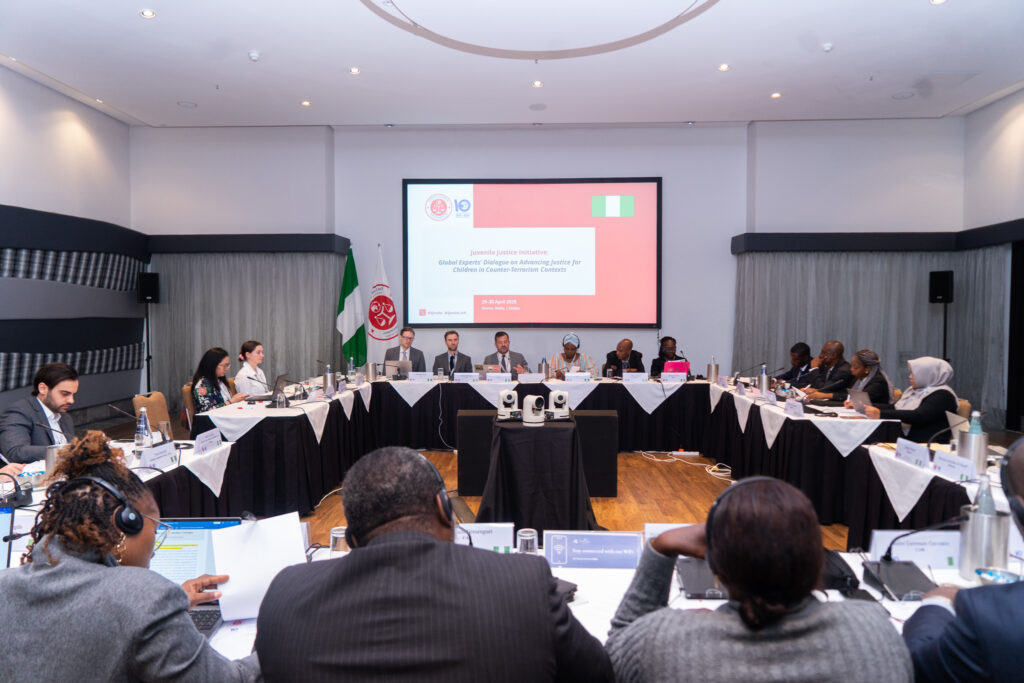
On 29 – 30 of April 2025, the IIJ with the generous support from the Federal Republic of Nigeria, hosted a hybrid Global Experts’ Dialogue on Advancing Justice for Children in Counter-Terrorism Contexts, in Sliema, Malta and online.
This significant event brought together juvenile justice practitioners, child protection experts and policymakers from across Africa, Southeast Asia, and the MENA region to tackle emerging challenges and shape future responses in advancing justice to protect children from recruitment and exploitation by terrorist actors worldwide. It provided a platform for cross-regional knowledge exchange with a strong focus on assessing progress in the implementation of child-sensitive legal frameworks and justice measures in counter-terrorism contexts, identifying persistent and emerging challenges – such as gender-specific issues, repatriation from conflict zones, preventing recidivism, online recruitment and exploitation – and developing actionable, cross-sector recommendations to ensure the long-term judicial protection, rehabilitation, and reintegration of children associated with armed and terrorist groups, whether as victims, witnesses, or alleged offenders.
The IIJ’s Executive Secretary, Mr. Steven Hill, and Ms. Mariam Fitumi Shaibu, Deputy Director, Child Development Department at the Federal Ministry of Women Affairs of the Federal Republic of Nigeria opened the event. Mr. Hill highlighted how this programme builds on the IIJ’s multi-year work on improving juvenile justice frameworks in counter-terrorism contexts as well as Nigeria’s commitment to advancing child-sensitive justice. Mr. Hill further emphasized the timeliness and importance of this programme to re-engage with practitioners and stakeholders from across the IIJ’s Juvenile Justice Initiative, consolidate past achievements, address emerging threats and build human rights centered and context-specific solutions aimed at impacting and improving juvenile justice practices in counter-terrorism contexts.

The dialogue’s hybrid format enabled broad participation, including practitioners involved in repatriation efforts from Northeast Syria and Iraq, as well as representatives from non-governmental, international and multilateral organizations such as UNICEF, UNODC and the ICRC. It featured eight expert-led sessions addressing critical issues in child-sensitive justice within counter-terrorism contexts. Discussions explored: legal and policy frameworks for the prosecution, rehabilitation, and reintegration of children associated with armed and terrorist groups; the complex "double status" dilemma of children viewed as both victims and perpetrators; legal safeguards to ensure due process and the protection of children’s rights throughout investigation, prosecution and adjudication; gender-specific challenges in juvenile justice; legal complexities and practical challenges involved in the cross-border repatriation of children from conflict zones; non-custodial sentencing for juvenile offenders; strategies to prevent recidivism and ensure long-term disengagement of children from terrorism – and countermeasures to the recruitment and exploitation of children by terrorist groups in the digital space. Each session offered different regional perspectives, highlighted implementation challenges, and proposed practical solutions to strengthen child-sensitive justice responses globally.
The event will directly inform the IIJ’s future programming — shaping upcoming national workshops, regional dialogues, and practitioner-led initiatives. Insights and recommendations gathered from this dialogue will help ensure that justice systems around the world adopt more sustainable, effective, rule-of-law compliant and child-centered justice responses in counter-terrorism contexts.
